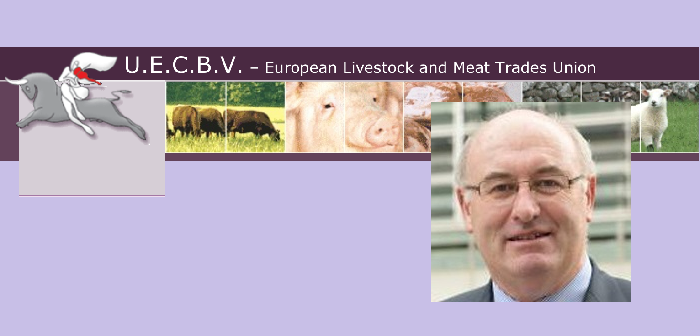Europe’s meat trade organisation, UECBV, has written to EU farm commissioner, Phil Hogan, urging him to pursue a “dynamic trade policy” on behalf of the livestock and meat sector, with special reference to urgent actions needed in relation to pigmeat.
The letter, signed by UECBV secretary general, Jean-Luc Mériaux, includes the following three priority action points:
1 – Re-open the Russian market, in compliance with the mandate that the European Commission (EC) received from the EU farm ministers in September and confirmed in November. UECBV is convinced that there is an opportunity for technical dialogue and agreement aiming at the resumption of the EU export of pork lard and offal to Russia in a short term.
In your speech (Dublin, November 3, 2015) you underlined that “the EU has an increasingly positive trade balance since 2010, and last year maintained its good export performance even despite the Russian ban”. However, in the pork sector, an in-depth analysis shows firstly an aggravation of the crisis and secondly a loss in export value in proportion to the cuts exported in 2015 compared to the cuts exported in 2014 and 2013, because of the veterinary certificate issue with Russia. All in all, the economic recovery of the EU pork sector needs the resumption of the exports to Russia, sooner rather than later.
2 – Consolidate existing markets such as China, Japan for pork. Since the deal by 12 countries on the TPP, the EU meat industry has had great concern motivated by the risk to lose market shares and even the Japanese market if the TPP is implemented before the EU-Japan FTA. The EU cannot afford to lose a second outstanding market (the EU exported 306,000 t. of high-quality pork to Japan in 2014 worth) in the pork sector. As a consequence, in terms of priority for the FTA conclusions, Japan shall be at the top of the list, before the USA, for the benefit of the EU agriculture, agri-food industry and meat industry.
3 – Open new markets. UECBV welcomes EC initiatives for opening up new markets for EU meat and meat products. The EC plays an important complementary role in this respect next to all initiatives taken by member states. In this way, the EC could contribute to bringing more balance in the market access situation between the EU and many Third Countries. Unfortunately, UECBV has to conclude that the EU is for its trading partners a much more accessible market than their market is for EU meat as far as SPS issues are concerned.
The letter further states that UECBV members are “suitable” for inclusion in trade missions around the world and that it “expects” that the EU meat sector will be part of the business delegations which are invited to accompany Commissioner Hogan (pictured above) on future visits.




